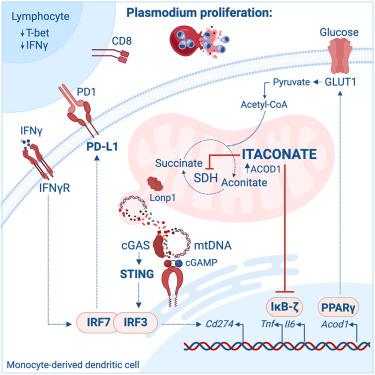当前位置:
X-MOL 学术
›
Cell Metab.
›
论文详情
Our official English website, www.x-mol.net, welcomes your feedback! (Note: you will need to create a separate account there.)
Itaconate impairs immune control of Plasmodium by enhancing mtDNA-mediated PD-L1 expression in monocyte-derived dendritic cells
Cell Metabolism ( IF 29.0 ) Pub Date : 2024-02-06 , DOI: 10.1016/j.cmet.2024.01.008 Theresa Ramalho , Patricia A. Assis , Ogooluwa Ojelabi , Lin Tan , Brener Carvalho , Luiz Gardinassi , Osvaldo Campos , Philip L. Lorenzi , Katherine A. Fitzgerald , Cole Haynes , Douglas T. Golenbock , Ricardo T. Gazzinelli
Cell Metabolism ( IF 29.0 ) Pub Date : 2024-02-06 , DOI: 10.1016/j.cmet.2024.01.008 Theresa Ramalho , Patricia A. Assis , Ogooluwa Ojelabi , Lin Tan , Brener Carvalho , Luiz Gardinassi , Osvaldo Campos , Philip L. Lorenzi , Katherine A. Fitzgerald , Cole Haynes , Douglas T. Golenbock , Ricardo T. Gazzinelli

|
Severe forms of malaria are associated with systemic inflammation and host metabolism disorders; however, the interplay between these outcomes is poorly understood. Using a model of malaria, we demonstrate that interferon (IFN) γ boosts glycolysis in splenic monocyte-derived dendritic cells (MODCs), leading to itaconate accumulation and disruption in the TCA cycle. Increased itaconate levels reduce mitochondrial functionality, which associates with organellar nucleic acid release and MODC restraint. We hypothesize that dysfunctional mitochondria release degraded DNA into the cytosol. Once mitochondrial DNA is sensitized, the activation of IRF3 and IRF7 promotes the expression of IFN-stimulated genes and checkpoint markers. Indeed, depletion of the STING-IRF3/IRF7 axis reduces PD-L1 expression, enabling activation of CD8+ T cells that control parasite proliferation. In summary, mitochondrial disruption caused by itaconate in MODCs leads to a suppressive effect in CD8+ T cells, which enhances parasitemia. We provide evidence that ACOD1 and itaconate are potential targets for adjunct antimalarial therapy.
中文翻译:

衣康酸通过增强单核细胞衍生树突状细胞中 mtDNA 介导的 PD-L1 表达来损害疟原虫的免疫控制
严重形式的疟疾与全身炎症和宿主代谢紊乱有关;然而,人们对这些结果之间的相互作用知之甚少。使用疟疾模型,我们证明干扰素 (IFN) γ 会促进脾单核细胞衍生的树突状细胞 (MODC) 中的糖酵解,导致衣康酸积累并破坏 TCA 循环。衣康酸水平升高会降低线粒体功能,这与细胞器核酸释放和 MODC 抑制有关。我们假设功能失调的线粒体将降解的 DNA 释放到细胞质中。一旦线粒体 DNA 被致敏,IRF3 和 IRF7 的激活就会促进 IFN 刺激的基因和检查点标记的表达。事实上,STING-IRF3/IRF7 轴的耗竭会降低 PD-L1 的表达,从而激活控制寄生虫增殖的 CD8+ T 细胞。总之,MODC 中衣康酸引起的线粒体破坏会导致 CD8+ T 细胞的抑制作用,从而增强寄生虫血症。我们提供的证据表明 ACOD1 和衣康酸是辅助抗疟治疗的潜在靶点。
更新日期:2024-02-06
中文翻译:

衣康酸通过增强单核细胞衍生树突状细胞中 mtDNA 介导的 PD-L1 表达来损害疟原虫的免疫控制
严重形式的疟疾与全身炎症和宿主代谢紊乱有关;然而,人们对这些结果之间的相互作用知之甚少。使用疟疾模型,我们证明干扰素 (IFN) γ 会促进脾单核细胞衍生的树突状细胞 (MODC) 中的糖酵解,导致衣康酸积累并破坏 TCA 循环。衣康酸水平升高会降低线粒体功能,这与细胞器核酸释放和 MODC 抑制有关。我们假设功能失调的线粒体将降解的 DNA 释放到细胞质中。一旦线粒体 DNA 被致敏,IRF3 和 IRF7 的激活就会促进 IFN 刺激的基因和检查点标记的表达。事实上,STING-IRF3/IRF7 轴的耗竭会降低 PD-L1 的表达,从而激活控制寄生虫增殖的 CD8+ T 细胞。总之,MODC 中衣康酸引起的线粒体破坏会导致 CD8+ T 细胞的抑制作用,从而增强寄生虫血症。我们提供的证据表明 ACOD1 和衣康酸是辅助抗疟治疗的潜在靶点。



























 京公网安备 11010802027423号
京公网安备 11010802027423号